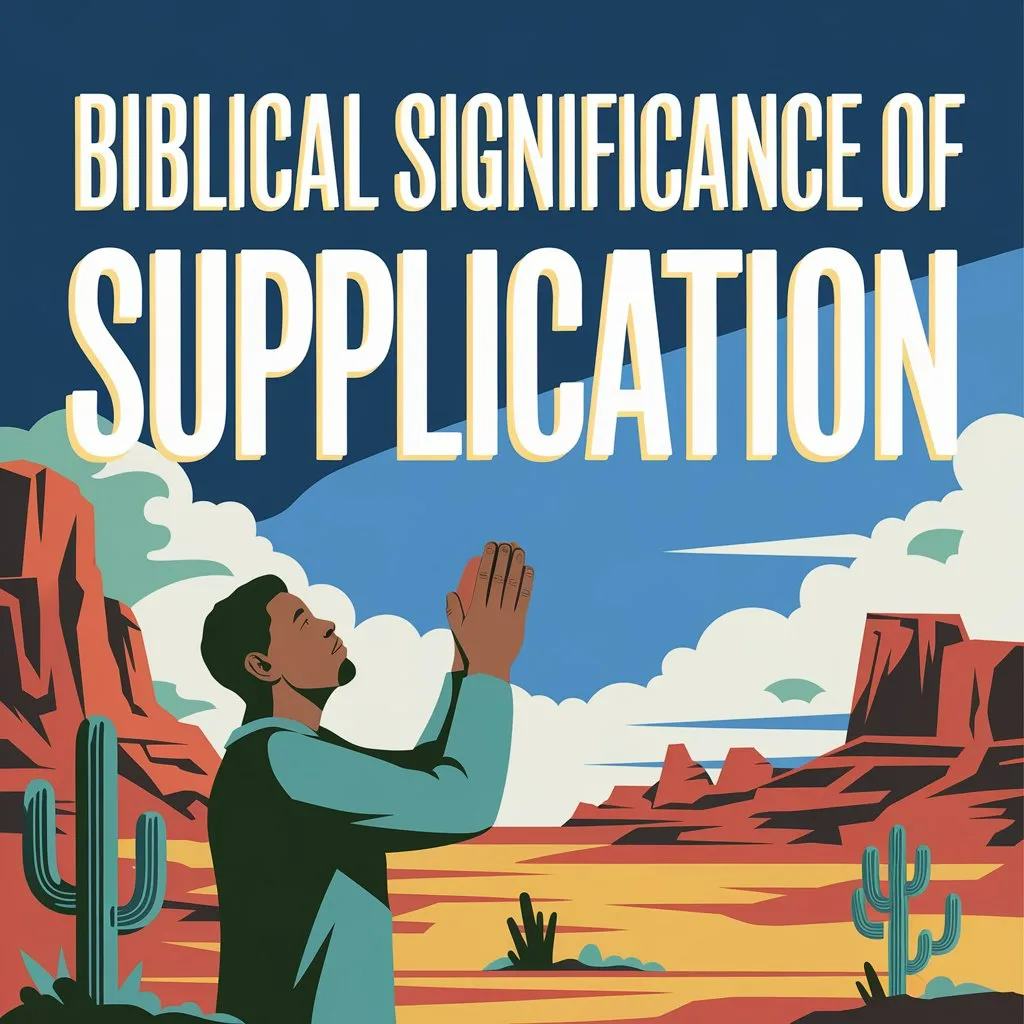In the realm of Christian spirituality, supplication stands as a powerful form of prayer that has been practiced for centuries. This earnest and humble approach to seeking God’s intervention has its roots deeply embedded in biblical teachings.
As we delve into the concept of supplication, we’ll uncover its profound significance in fostering a deeper connection with the Divine and experiencing the transformative power of faith.
Join us on this enlightening journey to explore the biblical meaning of supplication and how it can enrich your spiritual life.
Key Takeaways
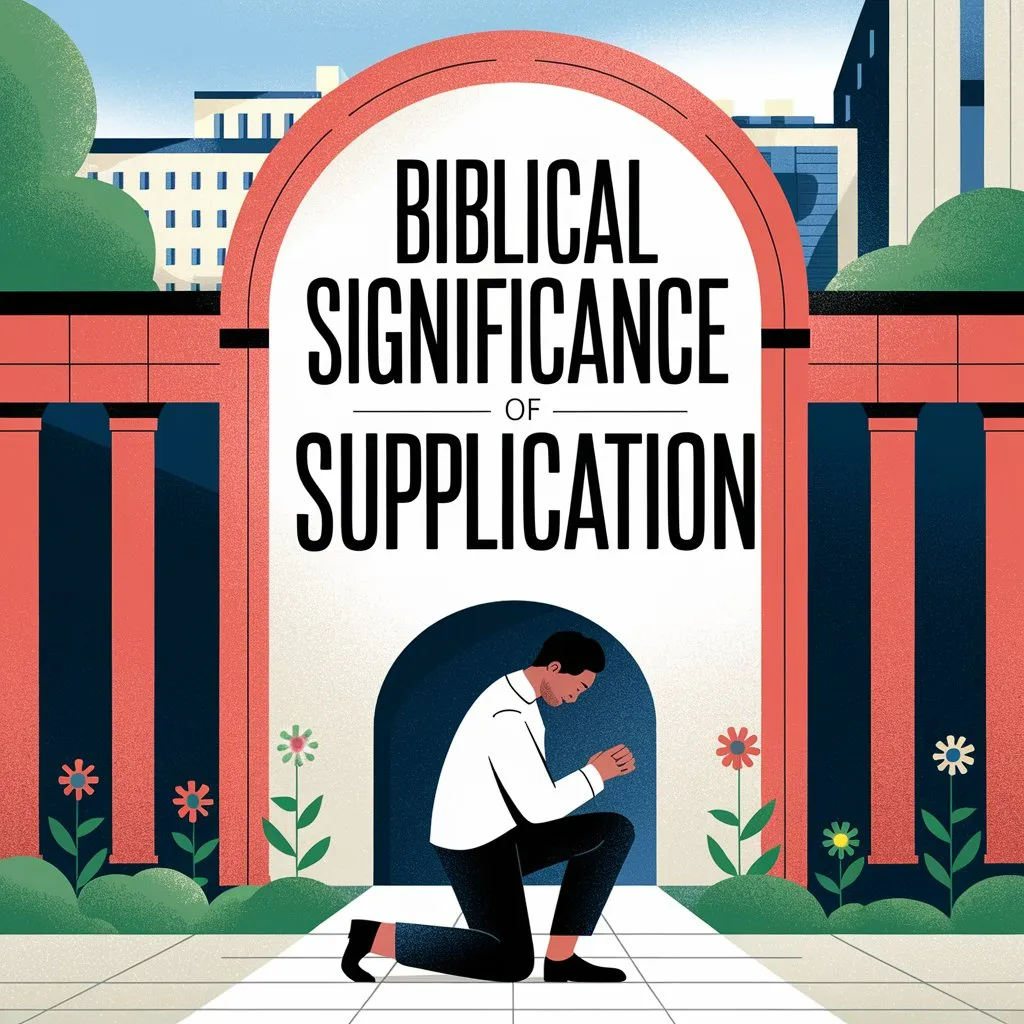
- Supplication is a form of prayer that involves humbly asking God for help or favor.
- It stems from the Latin word supplicare, meaning “to plead humbly.”
- Supplication is mentioned 60 times in the Bible, emphasizing its importance in Christian faith.
- It differs from general prayer by focusing on specific requests made with humility and urgency.
- Biblical examples include Moses, Hannah, David, and Jesus, demonstrating its power across generations.
- Supplication requires an attitude of humility, recognizing our dependence on God.
- It’s not just about asking, but also about aligning our will with God’s purposes.
- Effective supplication involves faith, persistence, and submission to God’s will.
- The Bible encourages believers to approach God with confidence in supplication (Hebrews 4:16).
- Regular supplication can lead to increased faith, peace, and a stronger relationship with God.
The Biblical Definition of Supplication
Supplication, in its biblical context, refers to a heartfelt and humble plea directed to God. It’s a form of prayer that goes beyond mere asking; it embodies a deep sense of need and dependence on divine intervention.
The Hebrew word tza’akah and the Greek word deesis, both translated as supplication, convey the idea of crying out for help or making a specific request to God.
The practice of supplication is deeply rooted in the biblical narrative, appearing in various forms throughout both the Old and New Testaments.
It reflects a profound understanding of the human condition and our inherent need for divine assistance. Through supplication, believers acknowledge their limitations and turn to God as the ultimate source of strength, wisdom, and provision.
The Essence of Supplication in Scripture
At its core, supplication is about recognizing our limitations and turning to God in complete trust.
It’s an acknowledgment that we are not self-sufficient, but rather, we rely on God’s grace and power. This attitude of humility is central to biblical supplication.
Supplication in Scripture often emerges from a place of deep emotional or spiritual need. It’s a raw and honest expression of the human heart, laying bare our vulnerabilities before God.
This authenticity in prayer is not only encouraged but celebrated in the Bible, as it demonstrates a genuine faith and reliance on God’s character and promises.
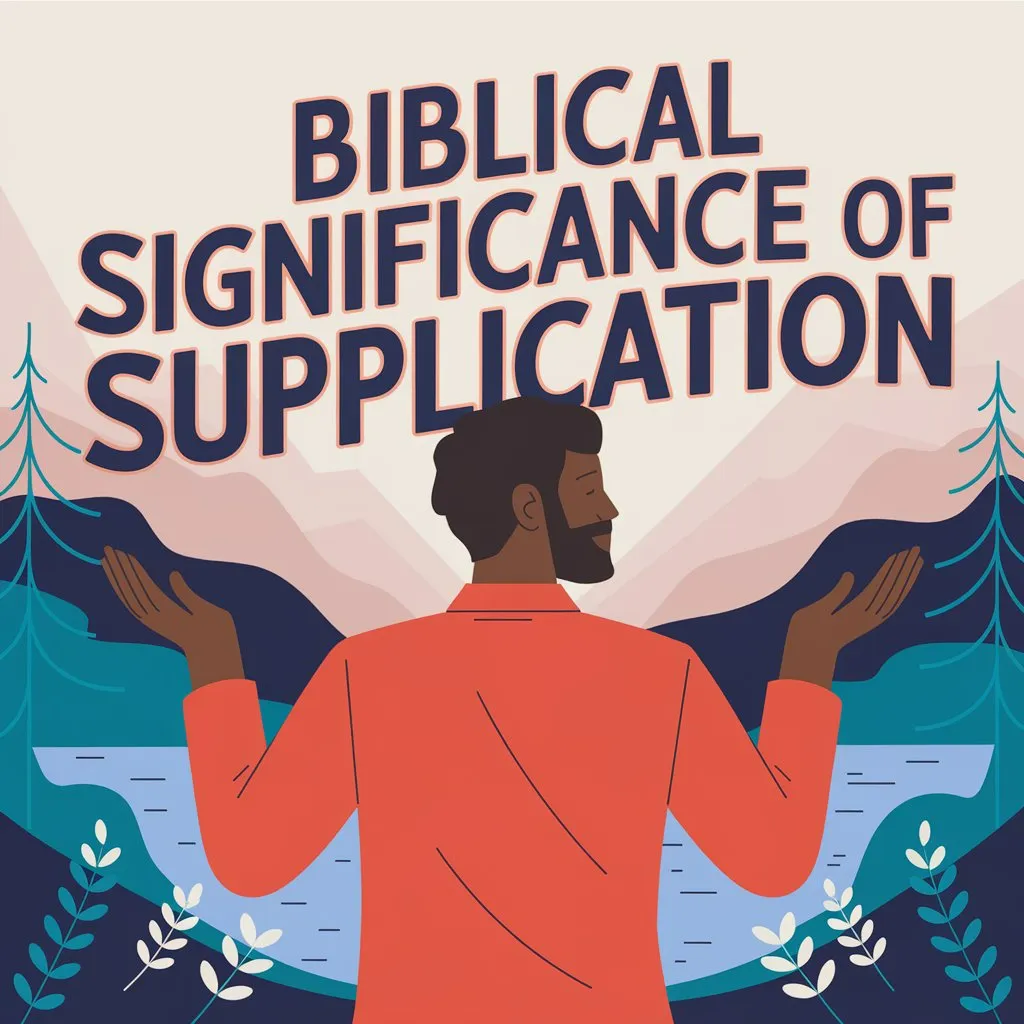
Distinguishing Supplication from Other Forms of Prayer
While all prayers involve communication with God, supplication stands out due to its specific nature and urgent tone.
Unlike general prayers of praise or thanksgiving, supplications are focused petitions arising from a deep sense of need or desire.
The uniqueness of supplication lies in its intensity and purpose. It’s not merely a casual conversation with God, but a fervent appeal for His intervention.
This form of prayer often arises from circumstances that seem beyond human control, prompting believers to seek divine assistance with a sense of urgency and desperation.
Supplication thus becomes a powerful tool for expressing faith in God’s ability to act in our lives.
Biblical Examples of Supplication
Hannah’s Prayer for a Child
One of the most poignant examples of supplication in the Bible is Hannah’s prayer for a child. Her heartfelt plea to God, made in the bitterness of her soul, demonstrates the raw emotion and desperation often associated with supplication.
Hannah’s supplication illustrates the power of bringing our deepest desires before God. Her prayer was not just a request for a child, but a vow of dedication to God’s service.
This example teaches us that supplication can be a transformative experience, aligning our desires with God’s purposes and leading to unexpected blessings.
David’s Supplications in the Psalms
King David’s psalms are filled with supplications. From seeking deliverance from enemies to pleading for forgiveness, David’s prayers show how supplication can cover a wide range of needs, both spiritual and physical.
David’s supplications in the Psalms provide a rich tapestry of human emotions and experiences brought before God.
His prayers range from joyful praise to desperate pleas, demonstrating that supplication is appropriate in all life circumstances.
David’s example encourages believers to approach God honestly, with both their triumphs and their struggles.
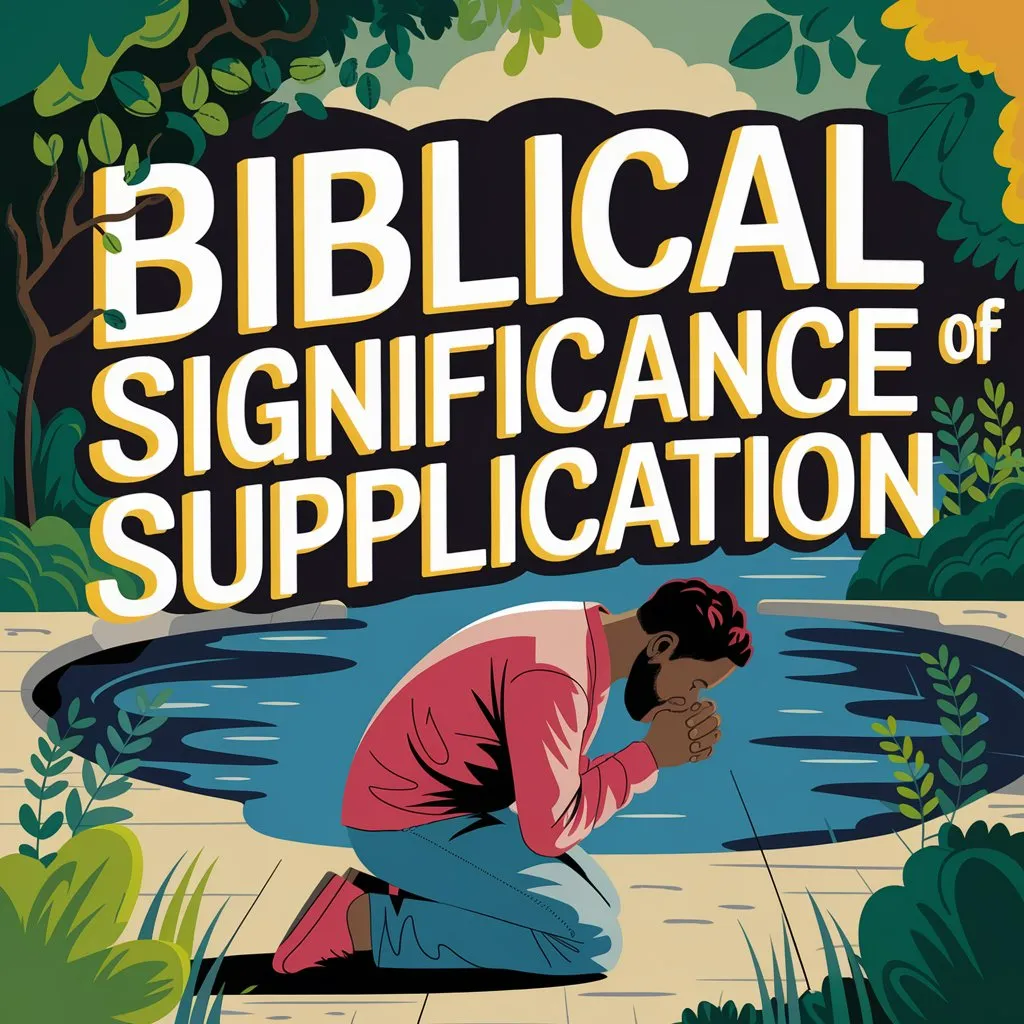
Jesus in the Garden of Gethsemane
Even Jesus, in His humanity, engaged in supplication. His prayer in the Garden of Gethsemane, asking for the cup of suffering to pass from Him, is a powerful example of supplication coupled with submission to God’s will.
Jesus’ supplication in Gethsemane reveals the depth of His human experience and the intensity of His relationship with the Father.
It demonstrates that even in moments of great anguish, supplication can be a source of strength and alignment with God’s purposes.
This example teaches us the importance of bringing our struggles to God while ultimately trusting in His sovereign plan.
The Power of Persistent Supplication
The Bible encourages persistence in supplication. Jesus’ parable of the persistent widow (Luke 18:1-8) teaches us to keep praying and not lose heart.
This persistence is not about wearing God down, but about aligning our hearts with His will and demonstrating our faith.
Persistent supplication cultivates a spirit of dependence on God and strengthens our faith.
It’s not about repetitive or mindless prayer, but about maintaining a posture of expectant trust in God’s faithfulness.
This persistence often leads to a deeper understanding of God’s timing and purposes, even when answers seem delayed.
Supplication and Faith
Effective supplication is intrinsically linked to faith. The book of James reminds us that when we ask, we must believe and not doubt (James 1:6). This faith is not in our ability to persuade God, but in His goodness and willingness to hear and answer our prayers.
Faith in supplication is not about believing God will always give us what we ask for, but trusting in His wisdom and love.
It’s a recognition that God’s answers may come in unexpected forms or timings, but they are always for our ultimate good.
This faith-filled approach to supplication transforms our prayers from mere wish lists to powerful expressions of trust in God’s character.
The Role of Humility in Supplication
Humility is a key component of biblical supplication. It’s about recognizing our place before God and approaching Him with reverence and awe. The Bible assures us that God resists the proud but gives grace to the humble (James 4:6).
Humility in supplication acknowledges our dependence on God and our inability to control all aspects of our lives.
It’s a posture of surrender that opens our hearts to God’s will, even when it differs from our own desires.
This humble approach to prayer fosters a deeper relationship with God, as we learn to trust His wisdom over our limited understanding.
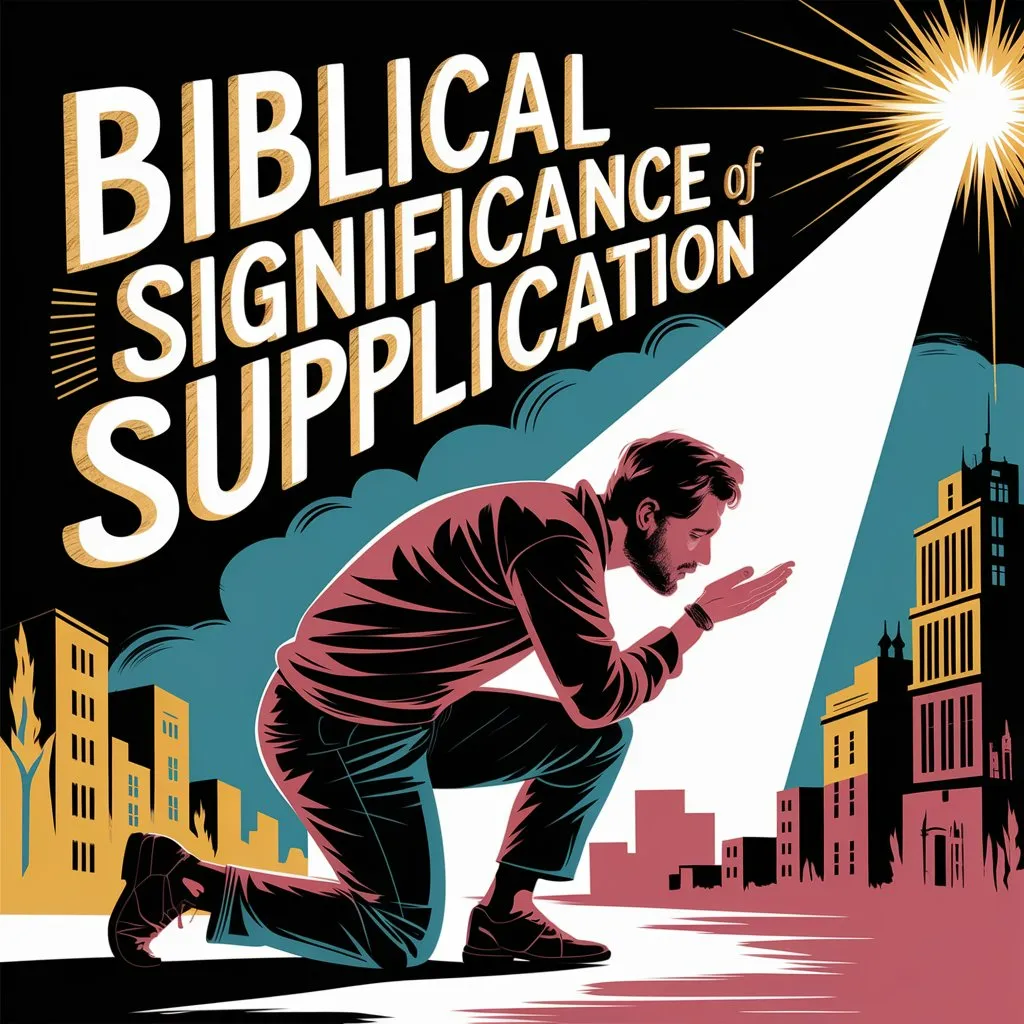
Supplication for Others: Intercessory Prayer
Supplication isn’t always about our own needs. The Bible encourages us to make supplications for all people (1 Timothy 2:1). This form of intercessory prayer demonstrates love for others and a desire to see God’s will done in their lives.
Intercessory supplication expands our perspective beyond our personal concerns, aligning our hearts with God’s love for all people.
It’s a powerful act of compassion that can bring comfort to those in need and foster unity within the body of Christ. Through intercessory supplication, we participate in God’s work of bringing His kingdom to earth.
The Promise of Peace Through Supplication
One of the beautiful promises associated with supplication is the peace it brings. Philippians 4:6-7 assures us that when we present our requests to God through prayer and supplication, His peace will guard our hearts and minds.
This promise of peace highlights the transformative power of supplication. As we bring our concerns to God, we experience a shift in our perspective and emotions.
The act of supplication itself becomes a source of comfort, reminding us of God’s presence and care in our lives. This peace surpasses human understanding, providing stability and assurance even in challenging circumstances.
Supplication in Times of Trouble
The Bible often portrays supplication as a response to trouble or distress. Psalm 50:15 encourages us to call upon God in the day of trouble, promising deliverance. This teaches us that supplication is a powerful tool in facing life’s challenges.
Supplication in times of trouble demonstrates our trust in God’s ability to intervene in our circumstances. It’s an acknowledgment that while we may not have the solutions, we know the One who does.
This practice of turning to God in difficulty cultivates resilience and hope, anchoring us in His faithfulness even when situations seem dire.
Balancing Supplication with Thanksgiving
While supplication focuses on asking, the Bible often pairs it with thanksgiving. This balance helps us maintain a grateful heart, even as we present our needs to God. It reminds us of God’s faithfulness in the past as we trust Him for the future.
The practice of combining supplication with thanksgiving cultivates a positive outlook and strengthens our faith. It shifts our focus from our problems to God’s goodness, helping us maintain perspective in difficult times.
This balanced approach to prayer enriches our relationship with God, fostering both intimacy and reverence in our communication with Him.
The Transformative Power of Supplication
Regular practice of supplication can transform our spiritual lives. It deepens our dependence on God, increases our faith, and aligns our will with His. Through supplication, we grow in our understanding of God’s character and His ways.
The transformative nature of supplication extends beyond our prayer life, influencing our entire worldview. As we consistently bring our needs and desires to God, we begin to see life through His eyes.
This practice shapes our priorities, decisions, and relationships, leading to a more God-centered existence. Supplication becomes not just a spiritual discipline, but a lifestyle of trust and dependence on God.
Supplication and God’s Will
An important aspect of biblical supplication is submitting to God’s will. Jesus modeled this in His prayer, “Not my will, but Yours be done” (Luke 22:42). This attitude recognizes God’s wisdom and sovereignty in answering our prayers.
Aligning our supplications with God’s will requires spiritual discernment and a growing knowledge of Scripture. It involves surrendering our desires to God’s greater purposes, trusting that His plans are ultimately for our good.
This approach to supplication fosters spiritual maturity, as we learn to seek God’s kingdom first in all our requests.
Practical Tips for Effective Supplication
- Be specific in your requests
- Pray with faith, believing God hears and answers
- Persist in prayer, even when answers seem delayed
- Align your requests with God’s will as revealed in Scripture
- Combine supplication with thanksgiving and praise
Implementing these tips can significantly enhance our practice of supplication. They help us approach God with clarity and purpose, while maintaining an attitude of faith and submission.
Regular application of these principles can transform our prayer life, making it more meaningful and effective. Remember, supplication is not about perfecting a technique, but about cultivating a relationship with God.
In conclusion, supplication is a powerful form of prayer that allows us to approach God with our deepest needs and desires. By understanding its biblical significance and practicing it regularly, we can experience a deeper connection with God and witness His transformative power in our lives. Remember, supplication is not just about getting what we want, but about aligning our hearts with God’s will and growing in our faith journey.
FAQs
What is the difference between prayer and supplication?
While prayer is a broad term encompassing various forms of communication with God, supplication specifically refers to making requests or petitions to God. It often involves a sense of urgency or deep need.
How often should I practice supplication?
The Bible encourages us to pray without ceasing (1 Thessalonians 5:17). This includes supplication. While there’s no set frequency, regular supplication helps maintain a constant connection with God and a reliance on His provision.
Can supplication change God’s mind?
Supplication is not about changing God’s mind but about aligning our will with His. It’s a means of participating in God’s plan and expressing our faith in His wisdom and goodness.
Is it selfish to make supplications for personal needs?
Not at all. God cares about every aspect of our lives. The Bible encourages us to cast all our cares upon Him (1 Peter 5:7). However, it’s important to balance personal requests with prayers for others and for God’s will to be done.
How can I know if my supplication is in line with God’s will?
Studying Scripture helps us understand God’s character and will. As we grow in our relationship with Him, we become more attuned to His desires. Always be open to the Holy Spirit’s guidance in your prayers.

Hello, I’m Zephyra, your guide at SpiritualityEssence.com. I’m passionate about uncovering life’s mysteries and sharing transformative insights. Let’s explore mindfulness, ancient rituals, and the path to a more awakened life together. Join me on this spiritual journey!

